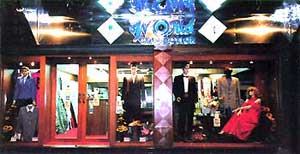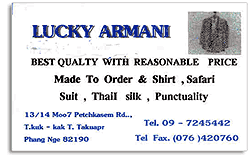 "Good afternoon," he said to me in German, "please come in and look at our men's suits."
"Good afternoon," he said to me in German, "please come in and look at our men's suits." I was strolling from the main street to my beachfront hotel in Khao Lak, a burgeoning strip of a seaside town about an hour and a half north of Phuket, in Southern Thailand. The mustachioed young man standing in front of the Lucky Armani Tailors was clearly not Thai. For my part, somewhat taken aback by the invitation in German, a language in which I have hardly any competence, I instinctively replied in Nepali. Not because I thought he might be Nepali, but simply because of the linguistic confusion engendered by being addressed in German in my feeble, one-non-native-language-at-a-time mind.
"I don't speak German," I said, but the effect of this simple declaration in Nepali was electrifying. The young man almost collapsed in wonder. "Are you Gorkhali?" he asked, staring with intent disbelief at my kuire blue grey eyes.
Travel the US today and you'll find Nepalis everywhere-Sherpas and Mustangis working in health food stores in Manhattan, Gurung shepherds in the Wind River Range of Wyoming and Nepali software engineers of all backgrounds churning out code in the Silicon Valley and its offshoots. So there's really no reason that an American expat living in Nepal, originally a Pennsylvania boy, then turned Californian, someone who now calls himself a New Yorker, should have been surprised to encounter Nepalis in Southern Thailand. After all, Thailand is much more Nepal's "backyard". Still, at that moment, I was so shocked that you could have knocked both me and Moti Lal KC over with a feather.
 Moti Lal and his many compatriots in Khao Lak, about 10 of whom I met later that day, are all Burmelis, Burmese Nepalis. Their ancestors, for the most part, went to Nepal with the great wave of British Gurkha troops sent there in the 1940s by the King Emperor to beat back the Japanese, who overran Burma in 1942. Many, like Moti Lal's grandfather (whose home village he knew only was somewhere in Eastern Nepal) stayed on in Burma and settled down in and around Mytikina, working as dairy farmers and gem miners. Although many Burmelis re-migrated back to Nepal after Ne Win came to power and confiscated their property, many stayed on. But times are rough in Burma and the meagre, but still relatively more attractive economic opportunities in Thailand have kept many Burmelis on the move.
Moti Lal and his many compatriots in Khao Lak, about 10 of whom I met later that day, are all Burmelis, Burmese Nepalis. Their ancestors, for the most part, went to Nepal with the great wave of British Gurkha troops sent there in the 1940s by the King Emperor to beat back the Japanese, who overran Burma in 1942. Many, like Moti Lal's grandfather (whose home village he knew only was somewhere in Eastern Nepal) stayed on in Burma and settled down in and around Mytikina, working as dairy farmers and gem miners. Although many Burmelis re-migrated back to Nepal after Ne Win came to power and confiscated their property, many stayed on. But times are rough in Burma and the meagre, but still relatively more attractive economic opportunities in Thailand have kept many Burmelis on the move. All the young Burmelis I met in Khao Lak worked in the tailoring business, some as actual tailors, and others, like Moti Lal, function as touts, standing outside the shops drumming up tourist business with their smattering of German, Italian and English. Most are in Thailand without work visas, but one of the Nepalis I met said that he had been born in Bangkok and was a Thai citizen. To my untutored ear, his Thai sounded perfect and in appearance too he could easily have passed for a Thai. His name was Dan Bahadur Subba and his shop was called "Don Berlin Tailors". Others sported jaunty names like "Continental Fashions," or Moti Lal's "Lucky Armani". Most of the Burmelis I met had Chhetri names and one even proudly pulled his janai out from his shirt to prove his twice-born status. This gesture immediately prompted assurances from all that "everybody drinks everyone else's water".
Neither Moti Lal nor any of the other Khao Lak Burmelis I met that day has ever been to Nepal. Yet all still spoke Nepali, albeit liberally mixed with Hindi, as their first language and one or more of the languages of Burma. For the most part, they were only dimly aware that Nepal is embroiled in a brutal armed conflict, but they all appeared to cherish a desire to someday see the Motherland. When I left them, I said that I hoped that someday, they would have a darshan of Pashupati. Yes, they said wistfully, but in the meantime, the Nepali community of Southern Thailand, they told me with pride, had already built a temple in Phuket that is modeled on the great shrine by the Bagmati. Perhaps the next time I'm in Phuket, I'll put on my Lucky Armani coat and see if I can get in.
(Mike Gill is a resident of Patan.)


